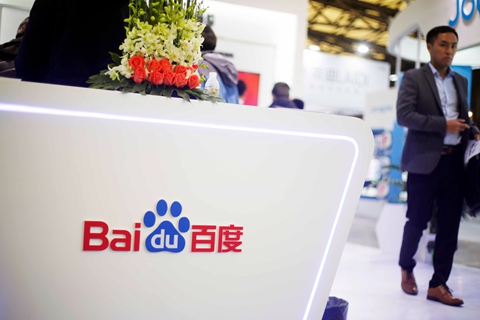Baidu Unveils New Division in Smart Device Push

Chinese internet search-engine giant Baidu Inc. announced an organizational shakeup on Tuesday to boost its push to become a major player in artificial intelligence and smart devices.
The tech company said it is merging three existing units — the Duer Business Unit, Raven Studio and the Hardware Ecosystem Division — to become the Smart Living Group. That newly created division will be directly supervised by Lu Qi, Baidu’s chief operating officer.
The Duer Business Unit has been developing Baidu’s conversational AI system DuerOS. Raven Studio has led Baidu’s development of innovative products. Meanwhile the Hardware Ecosystem Department has focused on device production and sales.
The reshuffle reflects Baidu’s attempt to expand from software development to smart-device production, as it pushes ahead its AI-focused business strategy, sources close to the company said.
Last year, the search-engine operator began repositioning its business focus to emerging sectors including AI, cloud computing and automatic driving. It has partnered with a number of companies to roll out smart devices powered by its DuerOS system, such as smart speakers, displays, televisions and refrigerators.
According to Baidu, as of January, the number of activated smart devices equipped with DuerOS exceeded 50 million.
Baidu has been reshuffling its resources to support its AI ambitions, especially since Lu, a former Microsoft vice president, took the helm as Baidu’s COO in January 2017. In March of last year, Baidu set up the Intelligent Driving Group by consolidating its automatic driving research assets. It also set up the AI Group to lead AI technology development.
The company also acquired startups to boost its AI capability, including projector manufacturer Xgimi, smart access control developer DDing and voice assistant developer Raven Tech.
The business transition is paying off. In the fourth quarter of last year, Baidu reported 29% year-on-year growth in revenue to 23.6 billion yuan ($3.7 billion). The company attributed the solid revenue growth to strong performance of its mobile and AI businesses, according to Baidu’s earning report.
Baidu is following global tech giants Amazon and Google into the smart device market. In 2014, Amazon released its AI-powered speaker Echo. Google launched its version of smart speaker — Google Home — in 2016 and the wireless network router Google Wifi.
Analysts said the push by tech majors into smart devices such as speakers is a key step toward getting market share for their voice-based AI systems, which are expected to become a ubiquitous part of daily life and the hub linking all kinds of devices and home appliances.
Contact reporter Han Wei (weihan@caixin.com)

- 1Cover Story: China Carves Out a Narrow Path for Offshore Asset Tokenization
- 2Drownings Shake Chinese Enthusiasm for Travel to Russia
- 3Over Half of China’s Provinces Cut Revenue Targets
- 4Li Ka-Shing’s Port Empire Hit by Forced Takeover Amid Panama Legal Dispute
- 5In Depth: China’s Mutual Fund Industry Faces Overhaul After a Banner 2025
- 1Power To The People: Pintec Serves A Booming Consumer Class
- 2Largest hotel group in Europe accepts UnionPay
- 3UnionPay mobile QuickPass debuts in Hong Kong
- 4UnionPay International launches premium catering privilege U Dining Collection
- 5UnionPay International’s U Plan has covered over 1600 stores overseas






